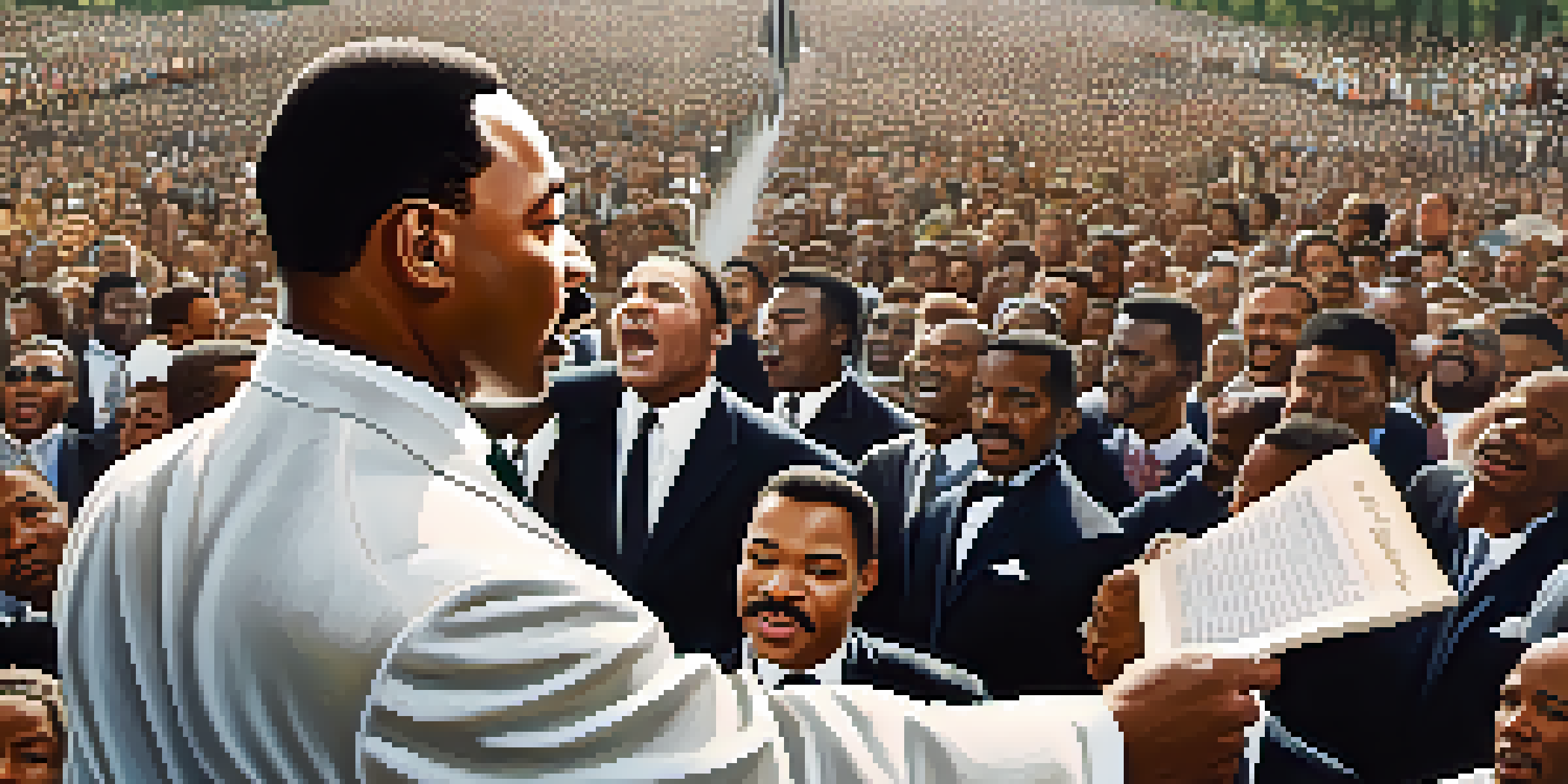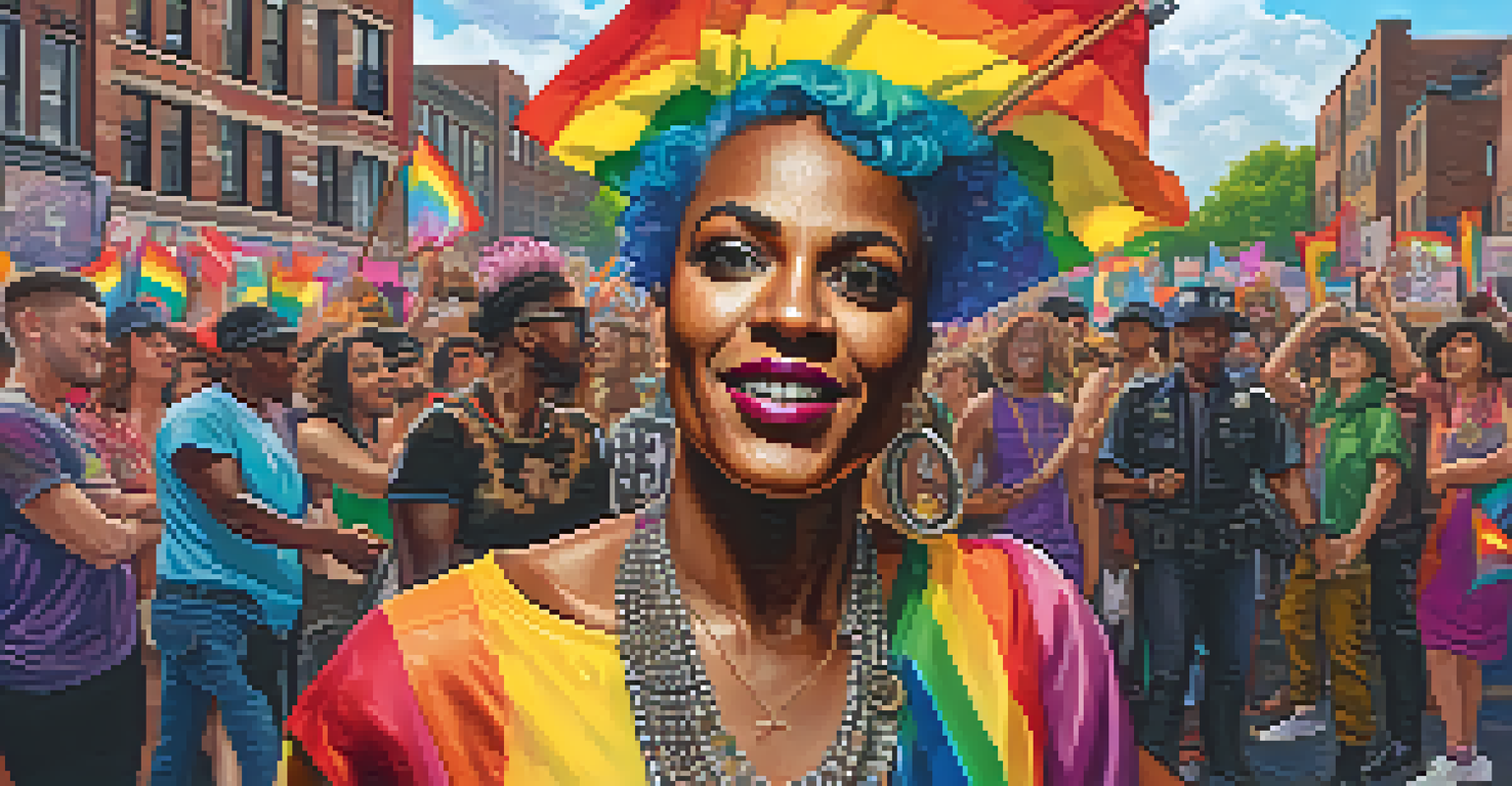Key Figures in the History of Community Activism

The Legacy of Martin Luther King Jr. in Activism
Martin Luther King Jr. is perhaps one of the most recognized figures in the history of community activism. His commitment to nonviolent protest during the Civil Rights Movement in the 1960s inspired millions to take a stand against racial injustice. King's famous 'I Have a Dream' speech not only highlighted the struggles of African Americans but also united people of various backgrounds in the fight for equality.
Injustice anywhere is a threat to justice everywhere.
Beyond his speeches, King organized grassroots campaigns and was pivotal in events like the Montgomery Bus Boycott and the March on Washington. His ability to mobilize communities and advocate for systemic change is a blueprint for many activists today. King's approach emphasized love over hate, showing that peaceful resistance could lead to profound societal changes.
Even after his assassination in 1968, King's influence endures. His teachings continue to resonate, inspiring new generations of activists to pursue social justice and equality through peaceful means. In many ways, King set the standard for what community activism could achieve when driven by unwavering determination and collective action.
The Impact of Cesar Chavez on Labor Rights
Cesar Chavez was a pivotal figure in the fight for labor rights, particularly for Latino farmworkers in the United States. Co-founding the United Farm Workers (UFW), he advocated for better wages and working conditions through nonviolent methods such as strikes and boycotts. Chavez's efforts brought national attention to the struggles faced by agricultural workers, highlighting issues of exploitation and injustice.

Chavez’s famous grape boycott in the 1960s rallied support from various communities and led to significant improvements in labor contracts. His emphasis on grassroots organizing encouraged many to join the movement, promoting solidarity among workers across different sectors. Chavez’s dedication to nonviolence and community empowerment has made him a lasting symbol of labor activism.
King's Nonviolence Inspired Activism
Martin Luther King Jr.'s commitment to nonviolent protest during the Civil Rights Movement serves as a timeless blueprint for community activism.
Today, Chavez's legacy continues to inspire labor movements around the world. His strategies of community organizing and collective bargaining remain relevant in modern activism, illustrating the power of unified voices. By advocating for those often overlooked, Chavez demonstrated that community activism could lead to substantial change in society.
How Rosa Parks Became the 'Mother of Civil Rights'
Rosa Parks is often celebrated as the 'Mother of the Civil Rights Movement' for her courageous act of defiance in 1955. By refusing to give up her seat to a white passenger on a segregated bus in Montgomery, Alabama, Parks sparked a nationwide movement against racial segregation. Her arrest led to the Montgomery Bus Boycott, which lasted over a year and significantly impacted the Civil Rights Movement.
The time is always right to do what is right.
Parks' act was not just a spontaneous decision; it was the result of years of activism and dedication to fighting for justice. She was involved with the NAACP and had long been an advocate for civil rights. Her bravery and commitment inspired others to join the cause, illustrating how one person's actions can ignite a larger movement.
Rosa Parks' legacy is one of resilience and strength. Her story serves as a reminder that community activism often starts with individual acts of courage. Today, she is remembered not only for her pivotal role in the movement but also as a symbol of the ongoing struggle for equality.
Malcolm X: A Voice for Black Empowerment
Malcolm X emerged as a prominent figure in the struggle for African American rights during the 1960s, known for his powerful rhetoric and unapologetic stance on racial issues. Unlike Martin Luther King Jr., Malcolm X advocated for self-defense and empowerment, challenging systemic racism head-on. His passionate speeches and writings called for Black pride and unity, pushing for a radical transformation of society.
Malcolm’s journey from a troubled youth to a national leader resonated with many who felt marginalized and voiceless. He emphasized the importance of education and self-determination, urging Black Americans to take control of their narratives. His ability to address the urgency of the fight for civil rights inspired a sense of urgency and activism among younger generations.
Chavez Advocated for Labor Rights
Cesar Chavez's grassroots organizing and nonviolent methods significantly improved labor conditions for Latino farmworkers, highlighting the power of collective action.
Though his life was tragically cut short, Malcolm X's influence continues to be felt today. His work highlighted the need for a multifaceted approach to activism, combining education, empowerment, and direct action. Malcolm X's legacy remains a powerful reminder of the fight for racial justice and the importance of self-advocacy in community activism.
The Role of Angela Davis in Social Justice Movements
Angela Davis is a renowned activist and scholar whose work spans decades and numerous social justice movements. Known for her involvement in the Black Panther Party and her advocacy for prisoners’ rights, Davis has been a vocal proponent of intersectionality in activism. Her insights into the connections between race, class, and gender have shaped contemporary discussions around social justice.
Davis’s activism took center stage during the Civil Rights Movement and the anti-Vietnam War protests, where she fearlessly spoke out against oppression. Her 1981 book, 'Women, Race & Class,' is considered a foundational text in feminist theory, illustrating the importance of including diverse voices in the fight for equality. Davis's commitment to social justice has inspired countless individuals to engage with these critical issues.
Today, Angela Davis remains an influential figure, advocating for prison abolition and human rights worldwide. Her ability to connect various forms of oppression emphasizes the need for an inclusive approach to activism. Through her work, Davis has shown that community activism is not just about one issue but about addressing the interconnectedness of all struggles for justice.
Marsha P. Johnson and the Fight for LGBTQ+ Rights
Marsha P. Johnson was a trailblazer in the fight for LGBTQ+ rights, particularly for transgender and gender-nonconforming individuals. As a prominent figure in the Stonewall uprising of 1969, Johnson's activism played a crucial role in the formation of the modern LGBTQ+ rights movement. Her fierce advocacy and unapologetic presence challenged societal norms and paved the way for greater acceptance and rights.
Co-founding the Street Transvestite Action Revolutionaries (STAR), Johnson worked tirelessly to support marginalized members of the LGBTQ+ community, providing shelter and resources for those in need. Her commitment to intersectionality highlighted the unique struggles faced by trans individuals, especially those of color. Johnson's work emphasized the importance of addressing these disparities within the broader fight for equality.
Mandela's Legacy of Resilience
Nelson Mandela's journey from prisoner to president exemplifies the strength of perseverance in the fight for justice and equality on a global scale.
Marsha P. Johnson’s legacy continues to inspire activists today, reminding us of the ongoing struggle for LGBTQ+ rights. Her life exemplifies the spirit of community activism—championing the rights of the most vulnerable and pushing for systemic change. Johnson's impact on the movement is a testament to the power of visibility and advocacy in creating a more inclusive society.
The Influence of Nelson Mandela on Global Activism
Nelson Mandela is a global icon of resistance and activism, recognized for his role in ending apartheid in South Africa. Mandela’s journey from a political prisoner to the first Black president of South Africa demonstrated the power of perseverance and dedication to justice. His leadership in the African National Congress (ANC) was instrumental in mobilizing the community against oppressive laws and practices.
Mandela's commitment to reconciliation and nation-building after his release from prison set an example for activists worldwide. He advocated for forgiveness and cooperation, understanding that lasting change requires unity and collaboration among diverse groups. His ability to inspire hope and resilience in the face of adversity has made him a symbol of peaceful resistance.

Today, Mandela's legacy continues to influence activism across the globe. His story serves as a reminder of the importance of fighting for justice while promoting peace. As communities worldwide grapple with issues of inequality and discrimination, Mandela’s life and work inspire a collective commitment to activism and a better future for all.